A History of the Mishnaic Law of Damages (5 vols.)
Digital Logos Edition
Overview
In this comprehensive five-part collection, distinguished professor and scholar of Judaic studies Jacob Neusner, examines the Mishnaic law of damages. These laws pertain to destruction done to oneself, to others, or to property, including animals. In the first four parts, Neusner provides an in-depth analysis of each chapter within the Mishnah tractates of the law of damages. In the fifth and final part, he concludes his research of these laws by explaining how they formed and changed over time.
In the Logos editions, these volumes are enhanced by amazing functionality. Important terms link to dictionaries, encyclopedias, and a wealth of other resources in your digital library. Perform powerful searches to find exactly what you’re looking for. Take the discussion with you using tablet and mobile apps. With Logos Bible Software, the most efficient and comprehensive research tools are in one place, so you get the most out of your study.
For more on Judaic legal history, be sure to check out Jewish Law.
Looking for more from distinguished Jewish scholar Jacob Neusner? Try the Jacob Neusner Jewish Studies Bundle, 99 volumes on Jewish history, religion, philosophy, and more.

- Offers translations and explanations of each of the tractates in the Mishnaic law of damages
- Gathers extensive research from primary sources
- Includes detailed appendixes, bibliographies, and lists of abbreviations and transliterations
- Title: A History of the Mishnaic Law of Damages
- Editor: Jacob Neusner
- Series: Studies in Judaism in Late Antiquity
- Publisher: Wipf & Stock
- Publication Date: 2007
- Volumes: 5
- Pages: 1,292
- Resource Type: Monographs
- Topic: Judaica
- A History of the Mishnaic Law of Damages, Part 1: Baba Qamma
- A History of the Mishnaic Law of Damages, Part 2: Baba Mesia
- A History of the Mishnaic Law of Damages, Part 3: Baba Batra, Sanhedrin, Makkot
- A History of the Mishnaic Law of Damages, Part 4: Shebuot, Eduyot, Abodah Zarah, Abot, Horayot
- A History of the Mishnaic Law of Damages, Part 5: The Mishnaic System of Damages
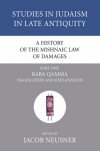
This is the first of a five-part presentation of the Mishnaic law of damages. Jacob Neusner provides a translation and explanation of Baba Qamma, the Mishnah tractate that deals with damages done by one’s chattel (oxen) and damages done by oneself, with particular focus on theft. Neusner examines Baba Qamma chapter by chapter, comparing its themes with those found in other Mishnah tractates and other Scripture passages.
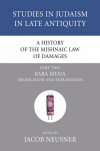
In part two of Jacob Neusner’s analysis of the Mishnaic law of damages, he provides a translation and explanation of Baba Mesia, the Mishnah tractate that deals with property relationships, particularly those regarding injured persons. Neusner examines Baba Mesia chapter by chapter, comparing its themes with those found in other Mishnah tractates and other Scripture passages.
Offers a rich discussion of a central religious problem and a multi-faceted treatment of a religion all too often portrayed in one-dimensional terms.
—Michael A. Sells, John Henry Barrows Professor of Islamic History and Literature, University of Chicago Divinity School
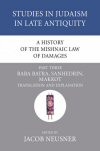
In this volume, Jacob Neusner continues his breakdown of the Mishnaic law of damages. He provides a translation and explanation of the following Mishnah tractates: Baba Batra, Sanhedrin, and Makkot. Baba Batra deals with real estate transactions and legal documents, with special attention paid to wills and bonds of indebtedness. Sanhedrin pertains to the organization of the Israelite government and court-system and punishments administered to those convicted by the courts of having committed various crimes. Makkot contains similar themes to Sanhedrin, concerning Israelite government and the punishments they administer. Neusner examines these tractates chapter by chapter, comparing their themes with those found in other Mishnah tractates and other Scripture passages.
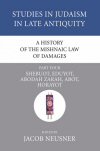
In part four of Jacob Neusner’s examination of the Mishnaic law of damages, he provides a translation and explanation of the following Mishnah tractates: Shebuot, Eduyot, Abodah Zarah, Abot, and Horayot. Shebuot deals with guilt offerings. Eduyot pertains to decisions made by religious authorities. Abodah Zarah concerns the issue of idolatry. Abot contains no law but is instead a collection of sayings from rabbinic leaders. Horayot deals with collective sin. Neusner examines these tractates chapter by chapter, comparing their themes with those found in other Mishnah tractates and other Scripture passages.
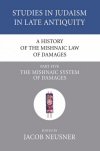
This fifth and final part of Jacob Neusner’s analysis of the Mishnaic law of damages analyzes the system as a whole and describes the formation of each tractate—from Baba Qamma to Horayot. Neusner then outlines the Mishnaic law of damages over the course of various time periods, such as the destruction of the temple of the period of Yavneh from 70 to 120 AD.
Jacob Neusner is research professor of theology and senior fellow of the Institute of Advanced Theology at Bard College.